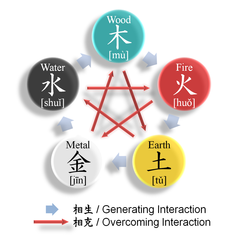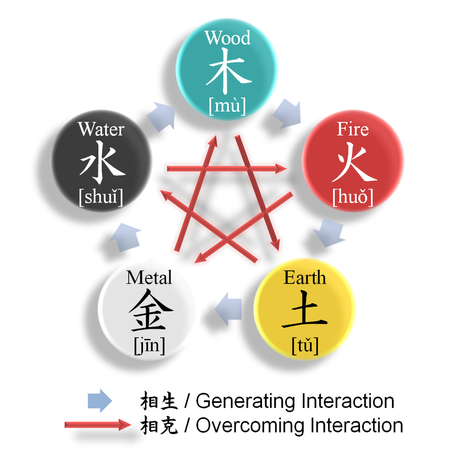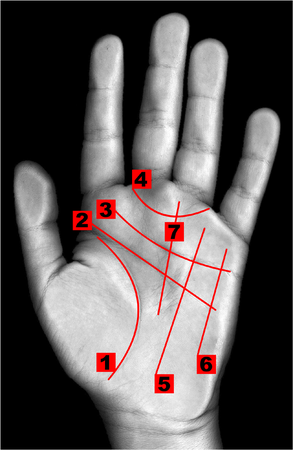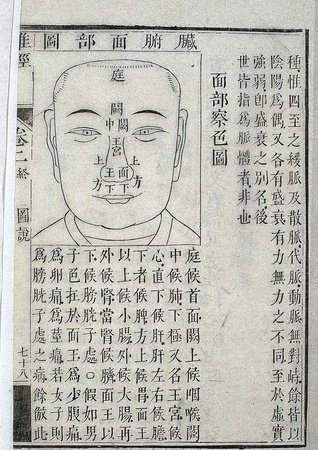
What lead to success according to Chinese?
Last updated: Wednesday December 29th, 2021
Report this blog
If you are Chinese, you would already be familiar with the phrase 一命二運三風水, which roughly translated as "one life two luck three feng shui". This phrase is usually extended to the fourth and fifth factor, and can go up to ten and beyond. In this blog, I will briefly explain what these mean and what the Chinese believe in.
1. Fate / Destiny (命)
The foremost thing that determines a person's success and happiness in life is what you were born into, e.g. whether you were born in a rich country, during peaceful time, with a wealthy and loving family, and destined to enjoy a comfortable and fulfilling life. In more modern terms, the Chinese call this "won (or lost) at the starting line".
Fate and destiny is totally out of your own control, unless you believe in karma and rebirth. Then whatever you did in your past lives determined how well you were born in this life. And the only thing you could do is to do good deeds in this life and hope for a better life in your next.
2. Luck / Fortune (運)
Even if you were born well, your luck can still go up and down at times. So the second most important factor is luck and fortune. You may think that this means winning the lottery. Well it can be, but it is much more than that. It can be that you invested wisely, or you manage to avoid accidents. Some superstitious people would do many things trying to improve their luck, such as carrying precious stones, picking a lucky number, or choosing a lucky date to get married, move house, open a business etc. However, some of this comes down to risk aversion and having good judgement.
3. Feng Shui (風水)
Feng shui, literally wind and water, is the Chinese concept of environmental effects on one's wellbeing, and the ways to improve such. This may sound superstitious (and in many ways it is), but many of these are common sense and you may already be practising it unknowingly. For example, maintaining good natural lights and air flow indoor, windows not facing objects that annoy you (e.g. your neighbour's roof or a busy road), or picking a south facing home (in the Northern Hemisphere). The concept is to have a good environment setting in which you would feel comfortable and can assist you. I can write a whole blog just on this topic, but I am no expert in this.
4. Accumulating Merits (積陰德)
This is something that one can actively work on and everyone should do so. Accumulating merits are based on the three "goods", namely saying good things, doing good deeds and having good intents. These are obvious, and according to the Chinese, these can also improve one's luck and fate in this and the next lives.
5. Study (讀書)
So perhaps you were not born into a good background, you can still work and study hard to improve your life. It is interesting that the Chinese rank this fifth, behind having good feng shui and doing good deeds. Many of you who are still studying may worry a lot about exams and getting into a good university course. However, many (Chinese) adults can tell you that while having a good education is important, it is not the most important thing in life.
While the first five are commonly known among all Chinese, the next five are lesser known. To be honest, I have never heard of these until I research for this blog. Anyway, here they are:
6. Name (名)
This may not be easily understood by many from Indo-European background, as their given names are common and generic. But for the Chinese and other East Asians, a person's given name is made up of one or (more commonly) two characters, and this can be chosen from thousands of characters in the language. Therefore most people's name are unique (although many lazy and unimaginative parents would keep reusing the few common words, such as "handsome", "strong", "great” for boys, or "pretty", "elegant", "kind" for girls. And similar to English names, there are different trends by the decades).
Many parents would hire a feng shui master (or at least ask the grandparents) to pick a good name for their child. A good name should match one of the five phases, which is determined by the date and time when the baby was born.

So say if you are born in the Wood phase, then you should pick a word with water element (such as ocean, ice, dew, tide) and avoid metal character (such as silver, blade, sharp).
This is only one of the many considerations in picking a good Chinese name. In fact, some people would change their name mid-life in order to improve their luck and fortune.
7. Palm & Face (相)
The Chinese, like many other ancient cultures, believe in palm reading (palmistry) and face reading (physiognomy), and developed their own system of interpretation. For example, a person's life journey is believed to travel around the face, starting from the ears (childhood), forehead (adolescent), eyes (30s), nose (40s), cheeks (50s) and lips (60s) and so on. A person with round earlobes are believed to have a happy childhood; a bigger nose means a great career (see Jacky Chan for example). Therefore a person with an auspicious (which is different from pretty) face and palms are considered to have a better life than others. Nowadays, some Chinese would even consider cosmetic surgery to improve their fortune, e.g. enlarging the nose, removing mole, reducing the jaw bone etc.


8. Respecting Gods (敬神)
Here the gods can be one of the thousand celestial beings in Taoism, or Buddhas/Bodhisattvas in Buddhism, or family ancestors. During important events, such as laying a building foundation, opening a shop, starting a movie shoot, or even on a major software release, the Chinese would conduct a praying ceremony, which involves burning incense sticks and offering food to the gods. Spiritually, the Chinese believes that if you pay respect to the gods (and ghosts), they would in turn look after you and help you when you are in need. Some Chinese Christians would maintain the same mindset, but simply switch their allegiance to the Western God.

9. Meeting Helpful People (交貴人)
Originally I translated this as "making good friends", but this is more than "good friends". Here, the idea is that a person would often need others' help to succeed, be it a good teacher, an honest friend, a great boss/mentor, or a kind stranger who pointed you the right way. If you have good fate and luck, you would always meet good people in your life.
10. Maintaining Good Health (養生)
Finally it is important to maintain good health. This includes eating well, having enough sleep, exercising etc. At the end, there is not much of a good life if you do not have good health to enjoy it.
So here are the ten factors that determine one's life. Many of these seem superstitious so you don't have to agree with all these. In fact, many Chinese do not take these too seriously, and would sometimes use the phrase "one life two luck three feng shui" jokingly or sarcastically.
So what do you think of these? Is there similar concept in your culture?

Me: • ____________ •
That was interesting to read. Of these I can only remember of feng shuî (because of TV 🤔).
When a baby is born, their family call a priest or an astrologer to look upon its horoscope and all. Kids are not named after their parents like they do in many western cultures. This is believed to bring bad luck. We also believe in the world famous concept of karma. If you do good things in "this" life, your next life will be better. Eventually, you'll attain moksha (salvation) and unite with God breaking the cycle of death and rebirth. In many north Indian cultures, south is considered evil and sleeping with legs facing that way is avoided. Before going out for an important event like job interview, college placement or competitions, people are encouraged to eat a spoon of dahi sakkar (curd and sugar) to bring good luck and secure winning and/or getting the preferred job.
Most of the time kids aren't named after their parents, but being named after your grandparents is very common.
There are many big and small Indian superstitions, it can be another blog.
Oh, that’s interesting. In Brazil you can put the name of you’re kid of “João”, “Enzo”, “Ubiratan”, “Ioiyoqowyeironznskslfjchnczbadu”, or even “<marquee width="60%" direction="up" height="19px">Text</marquee>”. You just need a little bit of decency and shame in the face lol. And anyone can choose, the mother, the father, the grandmother, Quizmaster, or even the nephew of the neighbor of your aunt. You just need conscience and trust on the people that are naming the kid lol.
that sounds like a superstitionhold up that didn't sound right loland sleeping in the south is avoided. This is because every direction has a god, and the one for the south is Yama, who happens to be the god of death. Side note: Yama isn't a bad god, and is more like a god of Karma, but the tradition is still there associating south as bad.Good blog explaining these concepts though, that's certain